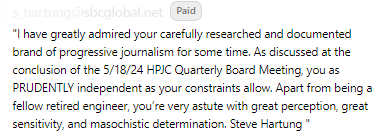A MAGA caller balked when I defined Trump but could not name one thing I was wrong about
A MAGA supporter criticized my definition of Trump yet failed to pinpoint a single error in my assessment. A respectful civil discussion silenced him.
A quick but important note before reading this prescient article
Effective today, we have 10.1 thousand followers and 130 supporting (paid) subscribers. WE NEED HUNDREDS MORE, especially in this political climate. Misinformation funded by the deep pockets of our Oligarchy floods the internet. We are using all our platforms on-air, online, and in publications to counter that. We ask that you invest the equivalent of less than a coffee to ensure we can keep doing this. Please invest in a Democracy that serves all of us by becoming a paid subscriber. It comes with many benefits.
A MAGA caller balked at how I defined Trump.
Few interactions capture the essence of the current polarized climate as effectively as those between a fervent supporter of former President Donald Trump and a progressive willing to engage. Such an interaction unfolded recently during my radio show when a MAGA caller, Joe, confronted me with fervent criticisms but failed to provide substantive counterpoints when challenged.
Joe, clearly an avid listener, started with a mixture of praise and critique. He complimented my voice, likening it to James Earl Jones, but quickly pivoted to a broad accusation: that I and others were misguided in their reliance on mainstream news sources like MSNBC and ABC. This criticism, common among Trump supporters, suggests a distrust of traditional media and an inclination toward alternative news sources, often those that align with their views.
I remained unflustered and focused as I interrupted Joe’s tangent about media reliability, honing in on a crucial point: “What did I say that was incorrect?” This simple yet powerful question underscores a fundamental aspect of constructive dialogue—specificity. Instead of addressing the question, Joe floundered, resorting to vague statements about my alleged “Trump derangement syndrome” and the biased nature of his commentary.
This exchange reveals a significant issue in modern political discussions – the reliance on generalities rather than concrete examples. When Joe was asked to cite specific inaccuracies in his statements, Joe admitted he should have taken notes, further indicating a lack of substantive arguments. This highlights a broader trend where rhetoric often trumps facts, particularly among those entrenched in ideological echo chambers.
When Joe shifted the conversation to Biden’s concrete achievements, I made an important point: I specifically mentioned President Biden’s policies that lifted more people out of poverty than any recent president. His initiatives, like increased childcare support, directly impacted poverty reduction rates. This factual recounting not only bolstered my argument but also provided a stark contrast to Joe’s nebulous claims.
The discussion about poverty was particularly telling. When I mentioned the tangible benefits of Biden’s policies, Joe attempted to deflect by suggesting a need to define poverty. My response was necessarily poignant – poverty is not an abstract concept requiring academic definitions; it is the lived reality of starvation and lack of basic needs. This grounded the conversation in human terms, emphasizing the real-world implications of policy decisions.
I continued to insist on specificity and factual evidence, a crucial strategy in political discourse, and asked Joe to return later with specific examples. In other words, I extended an olive branch. This approach fosters a more informed and constructive conversation, moving beyond partisan talking points to a more nuanced understanding of issues.
The interaction also underscores the importance of media literacy and critical thinking. Joe’s distrust of mainstream media and reliance on vague critiques mirror a broader issue where misinformation and partisan media shape public opinion. The method of deconstructing news and focusing on verifiable facts is a model for navigating this landscape. It encourages listeners to scrutinize sources and seek reliable information, which is essential for a healthy democracy.
In the end, Joe’s interaction exemplifies the challenges and strategies of engaging with opposing viewpoints. Remaining calm, demanding specificity, and providing factual counterpoints highlight the importance of informed discourse. It also illustrates the broader struggle for truth and clarity in an age of misinformation and partisan divides.
For progressives, this exchange offers valuable lessons in advocacy and communication. By focusing on concrete achievements and demanding accountability in arguments, they can more effectively counter misinformation and foster more productive political discussions. This approach strengthens their position and contributes to a more informed and engaged electorate.
My interaction with the MAGA caller is a microcosm of the current political climate. It showcases the need for specificity, factual evidence, and media literacy in political discourse. By adhering to these principles, progressives can advocate for their policies more effectively and engage with opposing viewpoints, ultimately contributing to a more informed and balanced public dialogue.-
Can we count on your help to reach our goal of 100 new paid subscriptions by the end of the month?
The other side has big donors and everyday citizens who invest heavily in platforms that lie and misinform. All we have is you. So, please invest in our media outlet by clicking the subscribe button below to become a paid subscriber. You won’t miss that coffee, but it will make a difference in our politics as we spread the truth about our policies and progressive politics. All paid subscribers get to read my five books on this platform and all subsequent books I write. They will also be privy to subsequent incentives.







